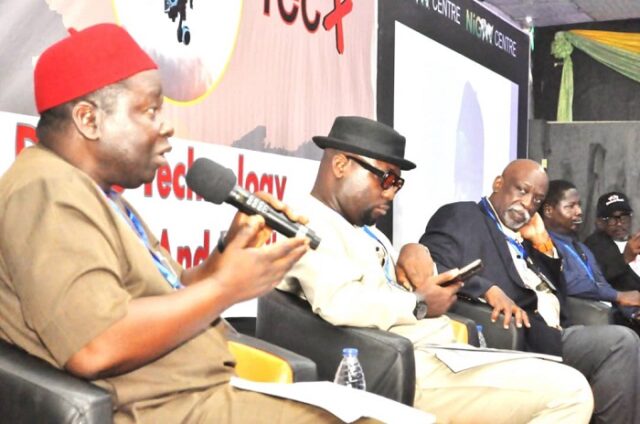
Drones haven’t met type certification anywhere because the platforms are not standardised.” He clarified that the absence of certification does not indicate a safety threat but reflects structural and operational differences with traditional aircraft.
BY ANTHONY OMOH
The Nigerian Civil Aviation Authority (NCAA) is working on applicable drone standards Nigeria to regulate an increasingly dynamic unmanned aviation sector. Currently, no drone has been officially certified for operation in Nigeria, according to Director of Aerodrome and Airspace Standards, Engineer Godwin Balang. He explained that while conventional aircraft undergo type certification, drones are still evolving and lack harmonised global standards for evaluation.
Balang said, “This is not just a Nigeria problem. Drones haven’t met type certification anywhere because the platforms are not standardised.” He clarified that the absence of certification does not indicate a safety threat but reflects structural and operational differences with traditional aircraft. The International Civil Aviation Organization provides a global framework, but countries are adapting it to suit their own national airspace realities.
Speaking at the 5th Drone Technology Conference and Exhibition (Dronetex2025), Balang outlined challenges and NCAA’s progress in drone regulation. He said drones fall into certified and uncertified categories, and at present, Nigeria has no certified platform in active operation. “These drones are in a category that lacks established certification criteria,” Balang explained during the conference.
“So, it should not come as a surprise that certification remains a challenge—for the aircraft, operators, and even for training.” He stressed that the NCAA conducts individual risk assessments for each drone because of the diversity in build, purpose and use. While this approach may seem slow, it reflects global trends where civil aviation bodies remain cautious with evolving drone technologies.
In a significant development, Engineer Balang announced that the NCAA will soon approve a new aviation training facility for drone operators. He described the school as “superior to several others across Africa,” including well-known institutions in Kenya and South Africa. “Give us just a few more weeks or maybe a month. The school is already complete,” Balang disclosed at the event.
He said the NCAA has chosen to be methodical, not rushed, in order to ensure the facility meets every operational benchmark. “We are not rushing it. We want to get it right,” he said. “It will be a game-changer for drone training in Nigeria.” Although the institution will not be classified as an Approved Training Organisation (ATO), it will be granted NCAA certification.
This strategic decision helps avoid confusion with conventional aviation schools while maintaining integrity in drone-specific education. The NCAA plans to replace full certification with competency certificates for drone operators and organisations, Balang confirmed during his session. “We’re taking the path many forward-thinking countries are now adopting,” he said.
“South Africa has reversed full certification for competency validation.” This flexible structure gives drone operators room to demonstrate proficiency without rigid licensing requirements unsuitable for modern drone functions. Industries including agriculture, construction, and public safety will benefit from a clearer path to legal drone operations under this framework.
Balang also revealed a streamlined process between the NCAA and Office of the National Security Adviser (ONSA) for drone-related approvals. “ONSA now refers applicants back to the NCAA for clearances. That’s not a bottleneck. It shows collaboration,” he said. Over 80 drone-related applications are currently in review at the NCAA, signalling a significant rise in interest and regulatory engagement.
Addressing widespread misconceptions, Balang clarified that registration for drone training is only N5,000, not in the millions as speculated. “The 2023 Regulations clearly state registration is around \$3–\$5, or N5,000. That aligns with international norms like in the U.S.,” he explained. He added that this process will soon be digitised through a drone registration portal under development with the Office of the NSA.
Balang stated that NCAA’s broader aviation vision includes using drones and small aircraft to connect rural and underserved communities. “The airstrip engagement we initiated isn’t just about infrastructure. It’s about access and connectivity,” he noted. Drones could be used for rural deliveries, medical services, and logistics where conventional aircraft are not feasible.
Earlier, event convener Mr Fortune Idu said the Dronetex2025 conference is part of the “Drone 101” public awareness initiative. He noted that with SME operators and hobbyists on the rise, education is key to ensuring safety and responsible drone use. “Drone 101 is the key. It will help operators understand safety requirements and assist NCAA in regulating the sector effectively,” he said.
With *applicable drone standards Nigeria* under development, the country is steadily paving the way for structured growth in the UAS industry. The evolving framework will provide clarity for operators while ensuring national airspace safety. Through partnerships, training, and innovation, Nigeria is aligning its drone ecosystem with global regulatory trends.























